Nutrition
Nutrition is especially important for us CFers. No matter if you do sports or not, a lot can be achieved with nutrition. Many CF sufferers have a so-called pancreatic insufficiency. This means that the pancreas does not produce any digestive enzymes, which means that food is not used properly and most nutrients are excreted again. To prevent this to some extent, we take medication such as Creon. This helps to absorb and store nutrients.
Nutrition is especially important for us CFers. No matter if you do sports or not, a lot can be achieved with nutrition. Many CF sufferers have a so-called pancreatic insufficiency. This means that the pancreas does not produce any digestive enzymes, which means that food is not used properly and most nutrients are excreted again. To prevent this to some extent, we take medication such as Creon. This helps to absorb and store nutrients.
Pancreatic insufficiency
Many of us CF sufferers have pancreatic insufficiency. This means that the pancreas produces little or no digestive enzymes. This means that most nutrients and fats are simply excreted. Over time, this leads to malnutrition, vitamin deficiency and so on. To prevent this, we take drugs like Creon. These help us digest nutrients and store them in the body. This is vital for us. If you have trouble thinking about Creon, put a reminder in your mobile phone, keep a small box in your pocket or ask someone to remind you while you eat. I recommend that you take the enzymes reliably.
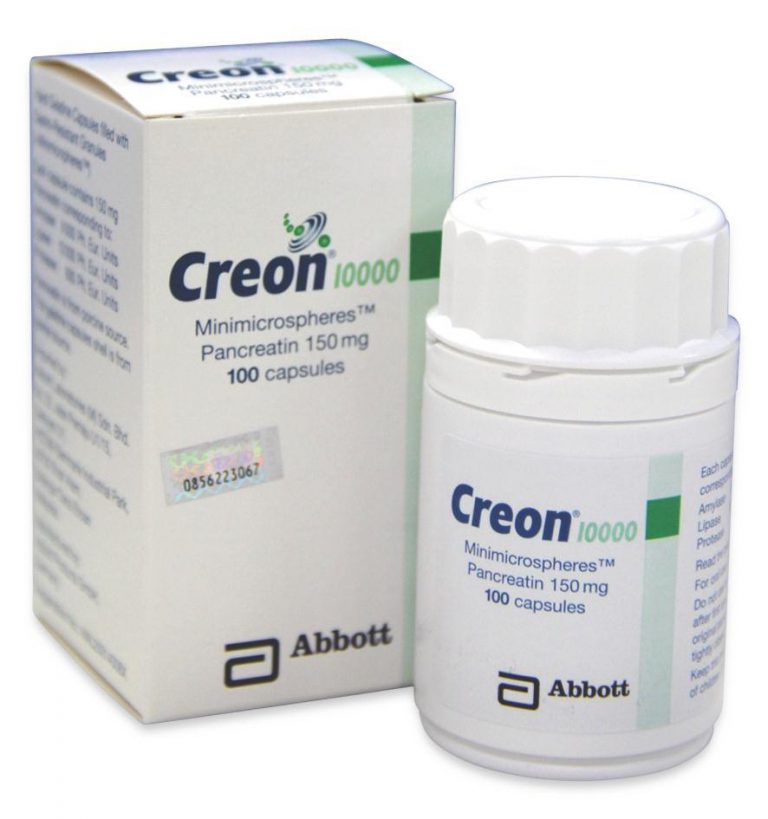
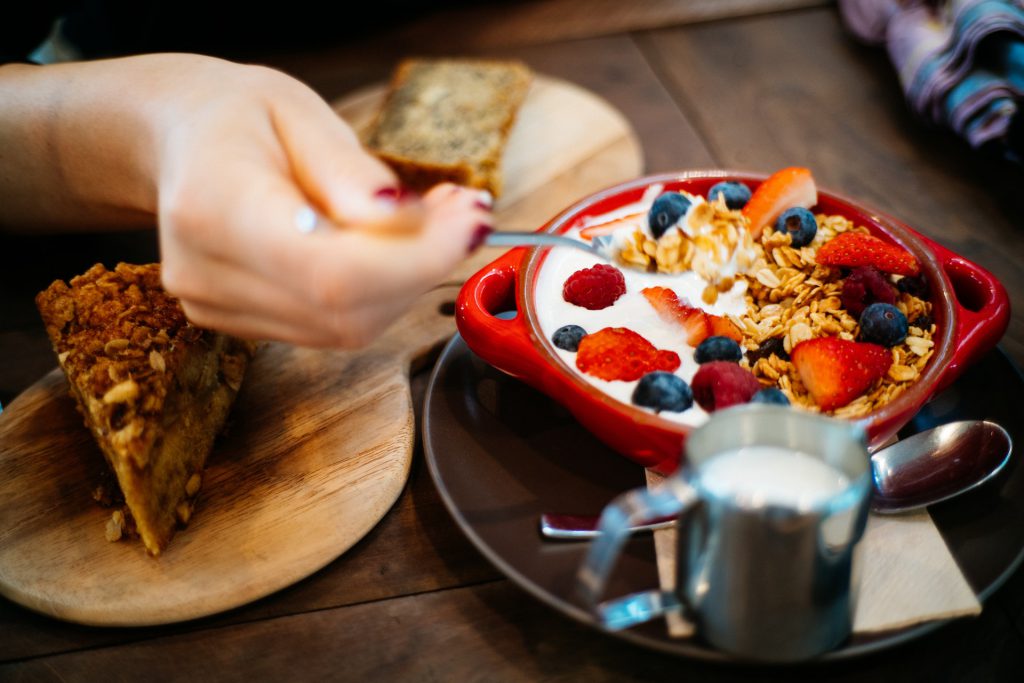
Calculate the amount of Creon needed
The number of Creon you should take for a meal can be easily calculated. Over time, you will automatically notice how much you need.
In general:
Per gram of fat you should take 2000-3000 units of lipase.
Example: A Magnum ice cream with 27gr fat results in 54000 - 81000 units.
If you're not sure yet, try it out. If you have taken too few units, you will experience abdominal pain and a fatty stool. If you have taken too much, you will probably also get stomach ache.
Enzymes are very individual. For example, I take about 20 pieces of Creon 25000 a day. That's 500'000 units, 250gr fat a day. (I also like to eat a lot).
Pancreatic insufficiency
Many of us CF sufferers have pancreatic insufficiency. This means that the pancreas produces little or no digestive enzymes. This means that most nutrients and fats are simply excreted. Over time, this leads to malnutrition, vitamin deficiency and so on. To prevent this, we take drugs like Creon. These help us digest nutrients and store them in the body. This is vital for us. If you have trouble thinking about Creon, put a reminder in your mobile phone, keep a small box in your pocket or ask someone to remind you while you eat. I recommend that you take the enzymes reliably.
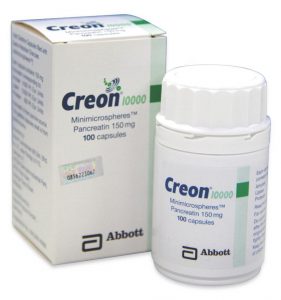
Calculate the amount of Creon needed
The number of Creon you should take for a meal can be easily calculated. Over time, you will automatically notice how much you need.
In general:
Per gram of fat you should take 2000-3000 units of lipase.
Example: A Magnum ice cream with 27gr fat results in 54000 - 81000 units.
If you're not sure yet, try it out. If you have taken too few units, you will experience abdominal pain and a fatty stool. If you have taken too much, you will probably also get stomach ache.
Enzymes are very individual. For example, I take about 20 pieces of Creon 25000 a day. That's 500'000 units, 250gr fat a day. (I also like to eat a lot).
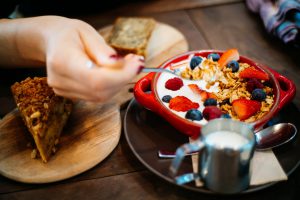
The correct nutrition for us?
The following text is strongly influenced by my own experience. Some nutritionists will not necessarily agree. That's a good thing. In my 25 years of life I have often been in nutrition counselling and have found my own way. Attention: If you have diabetes or a PEG, not all of the listed points can be helpful and healthy for you. It is best to discuss it with your nutritionist.
Is there a correct nutrition for us CFers?
No, there's not.
I would like to enumerate a few principles here, then give my opinion and a few tips.
With CF, we are not talking about a nutrition pyramid, but about a nutrition quadrilateral. The purpose behind it is: We don't necessarily need more vegetables and less fats, but the same amount of everything. Fat is especially important to us. Where healthy people have to be careful not to become overweight, most of us can in principle eat what we want and do not get fat. A dream, isn't it?
I also support this thesis. In many nutrition consultations it was said, eat what you want, as much as possible of everything, including sweet drinks, sugar, wheat and so on. I do not agree with that. Even if we don't absorb nutrients properly, we can still eat a healthy, high-fat diet without stuffing ourselves with sugar.
The following foods are very good for us: Birchermüsli, croissants, salami, raw ham, pizza, fried foods, nuts, avocado, yoghurt and of course some more.
For this topic, also read the article from mind lift
The correct nutrition for us?
The following text is strongly influenced by my own experience. Some nutritionists will not necessarily agree. That's a good thing. In my 25 years of life I have often been in nutrition counselling and have found my own way. Attention: If you have diabetes or a PEG, not all of the listed points can be helpful and healthy for you. It is best to discuss it with your nutritionist.
Is there a correct nutrition for us CFers?
No, there's not.
I would like to enumerate a few principles here, then give my opinion and a few tips.
With CF, we are not talking about a nutrition pyramid, but about a nutrition quadrilateral. The purpose behind it is: We don't necessarily need more vegetables and less fats, but the same amount of everything. Fat is especially important to us. Where healthy people have to be careful not to become overweight, most of us can in principle eat what we want and do not get fat. A dream, isn't it?
I also support this thesis. In many nutrition consultations it was said, eat what you want, as much as possible of everything, including sweet drinks, sugar, wheat and so on. I do not agree with that. Even if we don't absorb nutrients properly, we can still eat a healthy, high-fat diet without stuffing ourselves with sugar.
The following foods are very good for us: Birchermüsli, croissants, salami, raw ham, pizza, fried foods, nuts, avocado, yoghurt and of course some more.
For this topic, also read the article from mind lift
Are you struggling to gain weight?
I know that too! For years I was always too light, had troubles to get even a few grams more on the scale. If I didn't eat anything one evening, I was still half as heavy as usual.
But you're lucky, there is a way!
I would like to describe my way of gaining weight here. This may not be the way for everyone. If you think you want to try it, see what happens to you. If you need support, contact me. If you like, I'm also happy to help you personally.
My way of fighting underweight was through sport. When I started doing a lot of sports, I adapted my diet to my new lifestyle. The more I trained (which also brings many other advantages - see page Sports) the more I started to eat. The following points were very important for me and are part of my Patrick diet:
- No sugar. I.e. no more sweet drinks, no more sweet desserts and no more sweet snacks. Only my breakfast is sugary and the fruits and shakes I distributed throughout the day.
- Reduction of products containing wheat, i.e. bread, pasta, etc. They provide short-term energy, but they do not last very long and you get tired during digestion.
- Lots of fat! My breakfast already has 900 calories and 80 grams of fat. Where I can I put butter on it, and I fry my food with healthy fats. Nuts, avocado, cheese and inari beans are my fatty snacks.
- Additional protein shakes. This may not be everyone's cup of tea, but I take another Shake Massgainer a day, contains another 800 calories and 50 grams of protein (unfortunately also sugar).
- 2-3 litres of water. This helps to keep the cells fresh and the sputum liquid.
- Never be hungry. Eating regularly may be difficult in the beginning and requires a lot of effort. But the body gets used to it. I eat something at least every 2 hours. Even if it is only a handful of nuts. So the body is sufficiently supplied with nutrients.
- No alcohol. I know, it sounds hard. But if you google what alcohol does to the body, you'll agree that it's healthier without it. Even if you do sports, alcohol can destroy a lot of what you have built up. Do without it if possible. What can be healthy in small amounts is alcohol-free beer. It promotes the deposition of water in the cells. Also here, a maximum of one to two beers per week.
All this over a period of 3 months, in addition to sports, made me 6 kilograms heavier. I am aware that it sounds like a lot, like a big change, like little fun. That's exactly what it is, in the beginning. Your body will get used to it and you will see, it is fun when the scale suddenly shows more and more.
However, it is important to have a period from time to time when you eat and drink what you want. I usually do this during the holidays, then I don't train, I just enjoy.

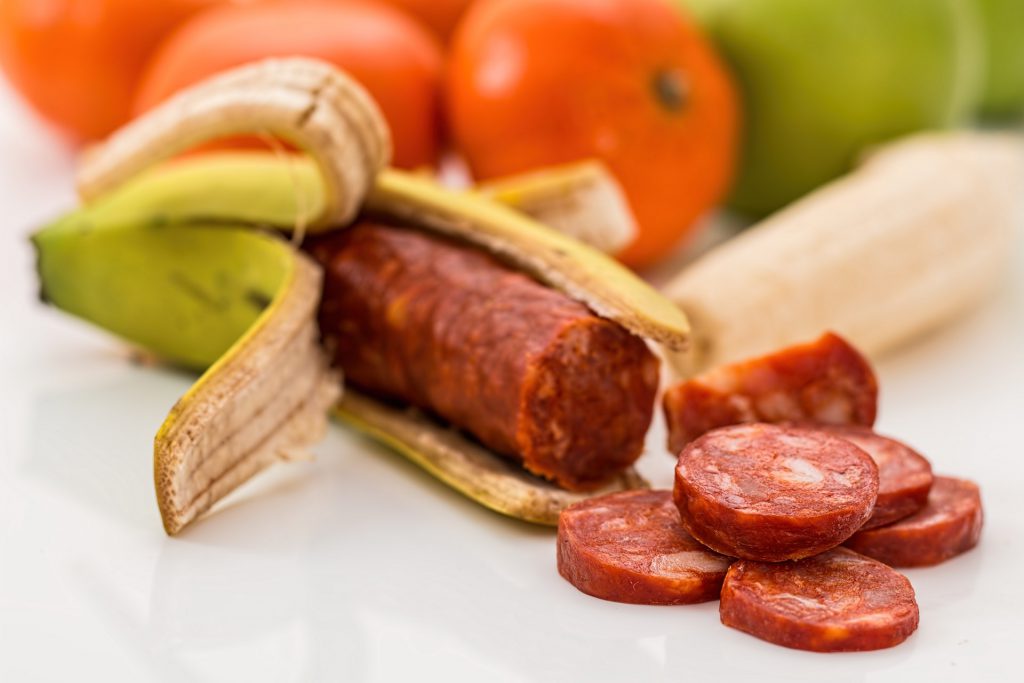
My nutrition plan
- For brekky: 1 yoghurt with double cream, fruits (banana, raspberries, strawberries) and raisins, mixed with protein muesli.
- Snack morning: An avocado, mixed nuts and cheese.
- Lunch: Free choice of meals during the week. Mostly with fried chicken, vegetables and sauce. At home a rich menu with lots of protein and fat. E.g. schnitzel fried in a lot of butter in a cream sauce, tomato salad with oil and a little pasta.
- Afternoon snack: Mass Gainer shake and dates.
- Dinner: Again fatty, mostly with chicken or protein containing vegi products, polenta or vegetable gratin. With cheese and ham.
- Dessert: A calorie shake (Fresubin or Massgainer again).
Are you struggling to gain weight?
I know that too! For years I was always too light, had troubles to get even a few grams more on the scale. If I didn't eat anything one evening, I was still half as heavy as usual.
But you're lucky, there is a way!
I would like to describe my way of gaining weight here. This may not be the way for everyone. If you think you want to try it, see what happens to you. If you need support, contact me. If you like, I'm also happy to help you personally.
My way of fighting underweight was through sport. When I started doing a lot of sports, I adapted my diet to my new lifestyle. The more I trained (which also brings many other advantages - see page Sports) the more I started to eat. The following points were very important for me and are part of my Patrick diet:
- No sugar. I.e. no more sweet drinks, no more sweet desserts and no more sweet snacks. Only my breakfast is sugary and the fruits and shakes I distributed throughout the day.
- Reduction of products containing wheat, i.e. bread, pasta, etc. They provide short-term energy, but they do not last very long and you get tired during digestion.
- Lots of fat! My breakfast already has 900 calories and 80 grams of fat. Where I can I put butter on it, and I fry my food with healthy fats. Nuts, avocado, cheese and inari beans are my fatty snacks.
- Additional protein shakes. This may not be everyone's cup of tea, but I take another Shake Massgainer a day, contains another 800 calories and 50 grams of protein (unfortunately also sugar).
- 2-3 litres of water. This helps to keep the cells fresh and the sputum liquid.
- Never be hungry. Eating regularly may be difficult in the beginning and requires a lot of effort. But the body gets used to it. I eat something at least every 2 hours. Even if it is only a handful of nuts. So the body is sufficiently supplied with nutrients.
- No alcohol. I know, it sounds hard. But if you google what alcohol does to the body, you'll agree that it's healthier without it. Even if you do sports, alcohol can destroy a lot of what you have built up. Do without it if possible. What can be healthy in small amounts is alcohol-free beer. It promotes the deposition of water in the cells. Also here, a maximum of one to two beers per week.
All this over a period of 3 months, in addition to sports, made me 6 kilograms heavier. I am aware that it sounds like a lot, like a big change, like little fun. That's exactly what it is, in the beginning. Your body will get used to it and you will see, it is fun when the scale suddenly shows more and more.
However, it is important to have a period from time to time when you eat and drink what you want. I usually do this during the holidays, then I don't train, I just enjoy.

My nutrition plan
- For brekky: 1 yoghurt with double cream, fruits (banana, raspberries, strawberries) and raisins, mixed with protein muesli.
- Snack morning: An avocado, mixed nuts and cheese.
- Lunch: Free choice of meals during the week. Mostly with fried chicken, vegetables and sauce. At home a rich menu with lots of protein and fat. E.g. schnitzel fried in a lot of butter in a cream sauce, tomato salad with oil and a little pasta.
- Afternoon snack: Mass Gainer shake and dates.
- Dinner: Again fatty, mostly with chicken or protein containing vegi products, polenta or vegetable gratin. With cheese and ham.
- Dessert: A calorie shake (Fresubin or Massgainer again).
A few questions and answers
Try it out. From my own experience I can say that the body gets used to it very quickly and you don't change over to the old diet afterwards. But since every body is different, I cannot answer this question conclusively. I continue to eat as described above, which is what helps me the most.
Unfortunately I can't answer this question. The above is a description of what helped me a lot. I do not have diabetes (but I am always borderline) and also no PEG. Here I lack the experience and I advise you to contact your local nutrition/diabetes counsellor.
Talk to the nutritionist at your CF Center or write to me. Together we can find out what it could be or what you could take as an alternative to yourself. I am not a trained nutritionist, but I can explain my way to you.
Yes and no. Basically hands away from refined sugar, i.e. sugar that occurs in sweet drinks, gummy goods such as gummy bears or other sweetened foods. For example, fruit sugar, which can be found in unprocessed fruit or fruit juices without additives, is healthier. But here too, not too much of it applies.
Sweet drinks do indeed have many calories, but bad ones. The calories come almost exclusively from the refined sugar it contains. Over time, this can lead to diabetes, especially in CF sufferers. I recommend that you consume healthy calories, e.g. via fat in nuts, avocado or other fatty foods that contain no or almost no sugar.
